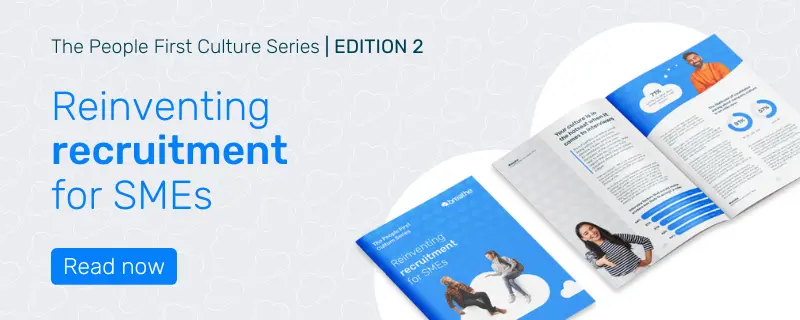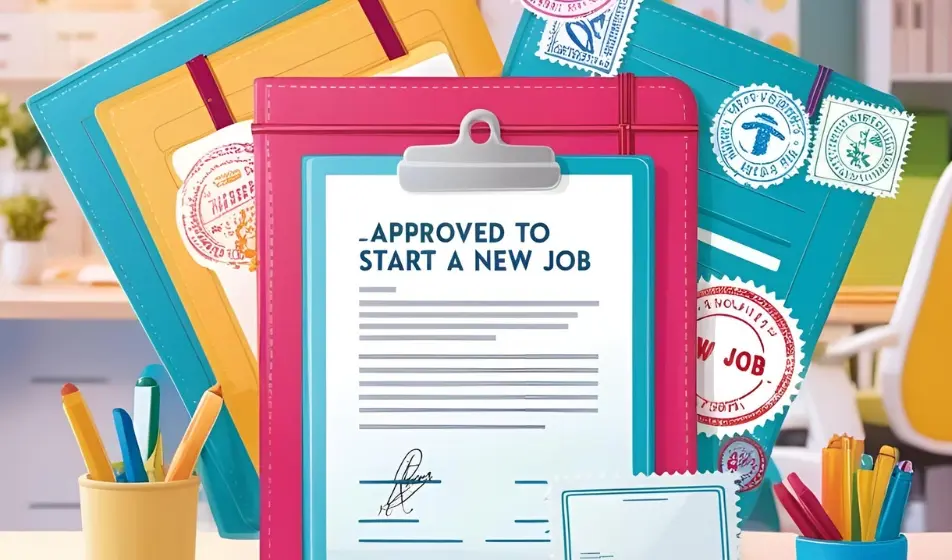After many hours of hard work, you've finally whittled down all potential recruits and are left with the ideal candidate. They fit the job description, align with your company's culture and seem like a great individual to work with. You just need to tick off their references.
But where do you start with a reference request? And what should you do if the response to your request is a bad reference?
Key takeaways
-
Always obtain permission from the candidate before contacting any referees.
-
Keep a consistent reference request format to avoid claims of unfair treatment.
-
Make job offers conditional on receiving satisfactory references.
-
Don’t overreact to negative feedback - look for patterns across multiple references.
-
Reference requests must comply with GDPR and the Equality Act 2010.
-
Follow up after a week if you haven’t received a response.
How to ask for a reference letter for a new employee
As an employer, you can request a reference by phone or email. Whichever you choose, the reference request should follow a similar format, in a professional tone. As a guide, keep the following in mind when writing your reference request:
Keep your approach consistent
Ensure you have a standard set of questions that can be used regardless of the employee, whether the request is being made over the phone or via email. This can help protect you from any claims of unlawful treatment.
Get permission before approaching any references
If a recruit has not provided you with a list of preferred references, make sure you get permission before approaching any. Without permission, you may fall foul of data protection laws.
Specify that employment offers are dependent on references
By specifying that all employment offers require a satisfactory reference check, you can prevent any repercussions if you have to rescind an offer of employment.
Don't overreact to bad references
Although a bad reference is never a good thing to see when hiring, don’t overreact. Ask for a selection of references from the employee and see if a pattern emerges. Sometimes the negatives highlighted by one may be contradicted by another. It can even be just the one-off words of a disgruntled ex-employer.
What laws affect reference requests?
There are a few UK laws you should keep in mind when requesting a reference for a potential employee.
Data protection
When asking for references you certainly need to be aware of data protection laws and GDPR in particular.
To keep it simple you must always get consent to approach a referee and all correspondence must comply with your own data protection policy. This means keeping all communications private and confidential.
Discrimination
The Equality Act of 2010 states that all candidates have the right to not be discriminated against. This gives the candidate protection from discrimination relating to age, race, religion, gender, disability, sex and sexual orientation. If you choose not to hire for any of these reasons you will be acting in direct contradiction to this law.
What can a character reference say?
A character reference is a short statement written by someone who knows the applicant well – often a mentor, colleague or volunteer supervisor. It’s a chance to highlight the person behind the CV and speak to their strengths, potential, and how they might shine in a new role.
According to ACAS, a character reference might include:
-
How the referee knows the applicant – for example, through mentoring or volunteering.
-
How long they’ve known them – helping give context to their perspective.
-
A few of the applicant’s key strengths – like communication, empathy or leadership.
-
Why they think the person would be a good fit for the new role.
What you can't say in a reference
Whether you’re giving a work or character reference, it needs to be fair, accurate and relevant. It should never be misleading or include anything discriminatory. According to ACAS, a reference must not:
-
Be misleading or include opinions that can’t be backed up with facts.
-
Contain irrelevant personal information.
-
Mention any reasonable adjustments made for a disability.
-
Refer to absence related to disability, maternity, paternity or adoption leave.
-
Include disciplinary records or investigations, unless they’re both recent and relevant.
It’s also important not to share anything related to protected characteristics - such as someone’s age, disability, race, religion, sex or sexual orientation. Doing so could be considered discriminatory.
What should you include in a reference request?
Now that we've covered how to ask for a reference and the laws involved, what should you actually include in your reference request?
To write a legally sound and insightful reference request, include the following:
-
Job title, employment dates, and salary
Verify the candidate's claims and confirm their employment history matches their CV. -
Details of any formal or informal warnings
Ask if the candidate received any recent disciplinary action, but seek full context before judging. -
Key achievements
Discover what the candidate excelled at to balance any negatives. -
Notable weaknesses
Gain insight into development areas - just ensure this doesn’t unfairly bias your hiring decision. -
Explicit consent for sensitive questions
If you need to ask about protected characteristics (race, gender, age, health, etc.), you must first obtain written consent from the candidate.
For a deeper dive into storing reference documents securely and tracking recruitment progress, check out Breathe’s recruitment and document management tools.
How to request a reference for a new employee
Before you make a job offer, it’s important to get honest, straightforward feedback from the candidate’s previous employer. You can do this via letter, email or phone (see templates below). Here’s how to ask for a reference in a professional, compliant way:
1. Confirm the candidate’s employment details
Begin by verifying their previous job title, employment dates, and salary. This helps confirm the accuracy of their CV and ensures honesty in the application process.
2. Ask about any formal or informal warnings
Enquire whether the candidate received any recent disciplinary action. If so, ensure this information is presented with full context before making judgments - it may not be a dealbreaker.
3. Balance weaknesses with achievements
Request insight into both strengths and areas for development. Be cautious about dismissing a candidate based on a weakness alone. Look for evidence of growth, and weigh achievements heavily in your decision-making.
4. Obtain explicit consent for sensitive questions
If you need to ask about protected characteristics (e.g. racial origin, gender, age, religion, health), you must first get written consent from the candidate. This ensures compliance with GDPR and the Equality Act 2010.
How to follow up a reference request
Still waiting for a response? Here's how to chase a reference without overstepping boundaries or wasting valuable time:
1. Wait at least one week
Give the referee a week or so to respond. Many professionals are busy, and a little patience goes a long way.
2. Follow up with a phone call
If no reply has come through, call the referee. Politely ask if they've had a chance to look at your request, and whether they’re likely to provide a reference.
3. Set a gentle deadline
If the referee is open to responding, suggest a preferred response date. This helps them prioritise and makes your request more actionable.
4. Have a backup plan
If a referee is non-responsive or unwilling, don’t waste time chasing endlessly. Ask the candidate to:
Provide another referee, or
Follow up themselves with the original contact.
Note: It's worth acknowledging that some people are busy and are difficult to get hold of. When this happens, you don't want to be spending all your valuable time asking someone to write a reference. Instead, ask the job applicant to provide you with a new one or chase it up themselves.
5. Don’t expect too much detail
Keep in mind that some referees may only share basic confirmation (e.g. job title and dates). That’s perfectly acceptable - just move on to your next steps.
What to do if an employer refuses to give a reference
Remember, there is no legal obligation for an employer to provide a reference for an ex-employee. In fact, some may choose to provide one if they cannot say anything constructive about that employee.
In this case simply move on to another on the reference list or ask the recruit for a new one.
A simple reference request letter template
If you’re stuck writing a reference request letter and need some inspiration, try using our template below.
To whom it may concern [Name of reference],
My name is [name] and I work for [company name]. We are currently in the process of hiring [candidate name] for the role [job title] and they have made it to the final stage of our hiring process.
Before any official offer is made, we need to gather some more information to guarantee we’re making the correct decision. We’re reaching out to you because [candidate name] [ provided you as a potential reference/ highlighted you as a manager in a previous role]. I would be grateful if you could tell me a bit about your overall experience working with [candidate name] and whether you’d recommend them as a potential employee
Would you be available for a brief discussion today or tomorrow? Please let me know if the number [applicant name] provided is accurate: [Phone number].
Alternatively, if you’d rather send me information via email, this would also be really helpful. Our communication is of course confidential.
Many thanks for for your help,
[Your name]
[Your job role and company]
Email reference request template
Or if you want to send an email, try this template.
Subject line: Reference request for [Candidate name]
Hi [Referee’s name],
I hope you’re well.
I’m [Your name], and I work at [Company name]. We’re currently considering [Candidate name] for the role of [Job title], and they’ve reached the final stage of our hiring process.
As part of our usual steps before making any offer, we’d really value hearing your perspective. [Candidate name] mentioned you as someone who could provide insight into their experience and strengths.
If you're happy to share a few thoughts, it would be a big help. You’re welcome to reply to this email or, if you'd prefer, we can arrange a quick call at a time that works for you.
Please rest assured anything you share will remain confidential.
Thanks so much for your time and support.
Best regards,
[Your name]
[Your role]
[Your contact details]
Phone call reference request template
Want to make a phone call to request a reference? Try this template as a script.
Hi [Referee’s name], it’s [Your name] calling from [Company name] – is now a good time?
I’m in touch because [Candidate name] is being considered for a [Job title] role with us, and they listed you as someone who could provide a reference.
I’d really appreciate hearing a bit about your experience working with them – particularly their strengths, working style, and anything you think we should know as a potential employer.
This call won’t take long, and everything you share will be treated in confidence.
Would it be alright if we went ahead now, or is there a better time for you?
Breathe easy with award-winning HR tools and software
Perfect for when you’re taking on new recruits, Breathe’s HR software will allow you to seamlessly track the recruitment from the start to finish, all while safely storing all your HR documents in one place.
FAQs
Q: What is a reference request?
A: A reference request is when an employer contacts a former employer or professional contact of a candidate to ask about their experience, performance, conduct, and suitability for a new role. This helps verify information provided during the hiring process and ensures the candidate is a good fit.
Q: Can an employer refuse to give a reference?
A: Yes, employers are not legally obligated to provide a reference. Some may choose not to respond if they feel they cannot give a constructive or accurate account. If that happens, simply move on to another referee or ask the candidate to provide an alternative contact.
Q: What should I do if I receive a bad reference?
A: Don’t jump to conclusions. Instead, request additional references and look for patterns. One negative comment may be an isolated issue or stem from a poor personal relationship. Focus on the overall feedback across multiple sources before making any decisions.
Q: Are reference checks subject to GDPR?
A: Yes. Under UK GDPR, you must obtain the candidate’s consent before contacting referees. All reference communications must be handled confidentially and stored in accordance with your data protection policies.

Author: Aimée Brougham-Chandler
An IDM-certified Digital Copywriter (2023) & English Language & Literature graduate (BA Hons), Aimée is Breathe's Content Assistant. With 3 years' content marketing experience, Aimée has a passion for writing - and providing SME HR teams with solutions to their problems. She enjoys delving into & demystifying all things HR: from employee performance to health and wellbeing, leave to company culture & much more.


.webp?width=458&height=305&name=comic_heroes_reference_letter_final_under_100KB%20(1).webp)



